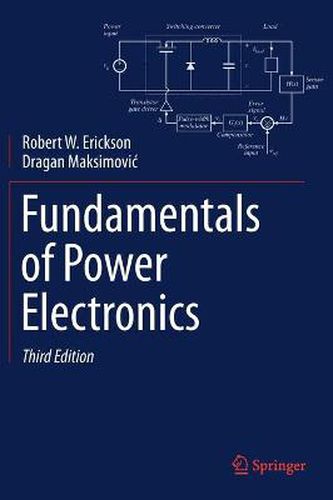Readings Newsletter
Become a Readings Member to make your shopping experience even easier.
Sign in or sign up for free!
You’re not far away from qualifying for FREE standard shipping within Australia
You’ve qualified for FREE standard shipping within Australia
The cart is loading…






This title is printed to order. This book may have been self-published. If so, we cannot guarantee the quality of the content. In the main most books will have gone through the editing process however some may not. We therefore suggest that you be aware of this before ordering this book. If in doubt check either the author or publisher’s details as we are unable to accept any returns unless they are faulty. Please contact us if you have any questions.
Fundamentals of Power Electronics, Third Edition, is an up-to-date and authoritative text and reference book on power electronics. This new edition retains the original objective and philosophy of focusing on the fundamental principles, models, and technical requirements needed for designing practical power electronic systems while adding a wealth of new material. Improved features of this new edition include: new material on switching loss mechanisms and their modeling; wide bandgap semiconductor devices; a more rigorous treatment of averaging; explanation of the Nyquist stability criterion; incorporation of the Tan and Middlebrook model for current programmed control; a new chapter on digital control of switching converters; major new chapters on advanced techniques of design-oriented analysis including feedback and extra-element theorems; average current control; new material on input filter design; new treatment of averaged switch modeling, simulation, and indirect power; and sampling effects in DCM, CPM, and digital control.
Fundamentals of Power Electronics, Third Edition, is intended for use in introductory power electronics courses and related fields for both senior undergraduates and first-year graduate students interested in converter circuits and electronics, control systems, and magnetic and power systems. It will also be an invaluable reference for professionals working in power electronics, power conversion, and analog and digital electronics.
$9.00 standard shipping within Australia
FREE standard shipping within Australia for orders over $100.00
Express & International shipping calculated at checkout
This title is printed to order. This book may have been self-published. If so, we cannot guarantee the quality of the content. In the main most books will have gone through the editing process however some may not. We therefore suggest that you be aware of this before ordering this book. If in doubt check either the author or publisher’s details as we are unable to accept any returns unless they are faulty. Please contact us if you have any questions.
Fundamentals of Power Electronics, Third Edition, is an up-to-date and authoritative text and reference book on power electronics. This new edition retains the original objective and philosophy of focusing on the fundamental principles, models, and technical requirements needed for designing practical power electronic systems while adding a wealth of new material. Improved features of this new edition include: new material on switching loss mechanisms and their modeling; wide bandgap semiconductor devices; a more rigorous treatment of averaging; explanation of the Nyquist stability criterion; incorporation of the Tan and Middlebrook model for current programmed control; a new chapter on digital control of switching converters; major new chapters on advanced techniques of design-oriented analysis including feedback and extra-element theorems; average current control; new material on input filter design; new treatment of averaged switch modeling, simulation, and indirect power; and sampling effects in DCM, CPM, and digital control.
Fundamentals of Power Electronics, Third Edition, is intended for use in introductory power electronics courses and related fields for both senior undergraduates and first-year graduate students interested in converter circuits and electronics, control systems, and magnetic and power systems. It will also be an invaluable reference for professionals working in power electronics, power conversion, and analog and digital electronics.